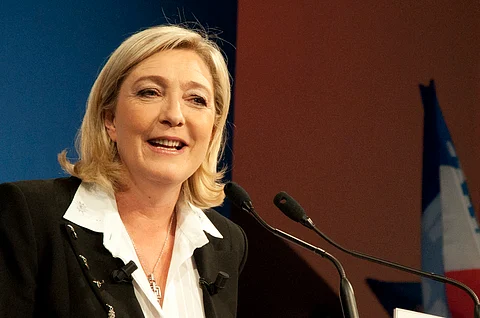

In a move that has sent political shockwaves across Europe, French opposition leader and presidential frontrunner Marine Le Pen has been sentenced to four years in prison—two of them suspended—for alleged misuse of European Parliament funds. The ruling also bars her from holding public office for five years, potentially ending her 2027 presidential ambitions.
While the French judiciary insists the verdict stems from financial misconduct, critics across the political spectrum see it differently: as a politically charged decision aimed at silencing a prominent voice on the European right.
Italian Prime Minister Giorgia Meloni was among the first to publicly question the ruling. Speaking to Il Messaggero, she acknowledged not knowing the full details of the case but made her position clear: “I think that no one who cares about democracy can rejoice in a sentence that affects the leader of a large party and takes away representation from millions of citizens.”
Meloni’s statement was echoed by Italian Deputy Prime Minister Matteo Salvini, who framed the ruling as a “declaration of war by Brussels,” tapping into growing populist sentiment that sees EU institutions as out of touch with national sovereignty.
Former U.S. President Donald Trump also weighed in, describing the ruling as “a very big deal,” and comparing it to the legal actions brought against him under President Biden. “It’s always the same story when political outsiders start to win,” he said on Truth Social.
Trump’s comments reflect a growing concern among populist leaders that judicial systems are being weaponized to block political dissent—particularly those with views critical of NATO, EU federalism, and the current Western consensus on Ukraine and Russia.
Le Pen, who denies all wrongdoing, insists the charges are politically motivated and has vowed to appeal. “I’m combative. I won’t let myself be eliminated,” she said on French television Monday night.
The timing of the verdict is particularly striking. A recent Ifop poll shows Le Pen commanding between 34% and 37% support for the 2027 election—over ten points ahead of her nearest rival, former Prime Minister Edouard Philippe.
Her party, National Rally (RN), already holds the largest bloc in the National Assembly, and her increasingly mainstream appeal has unsettled both the establishment left and center-right in France.
Le Pen’s foreign policy stance has long made her a thorn in the side of Brussels. A vocal critic of NATO expansion, she opposes Ukraine’s accession to the alliance and has spoken out against continued EU sanctions on Russia. These views have placed her on the margins of European orthodoxy—but increasingly in line with growing public fatigue over endless war and economic fallout.
It’s this combination of domestic populism and foreign policy dissent that makes her a target—not just of her political rivals, but of institutional power.